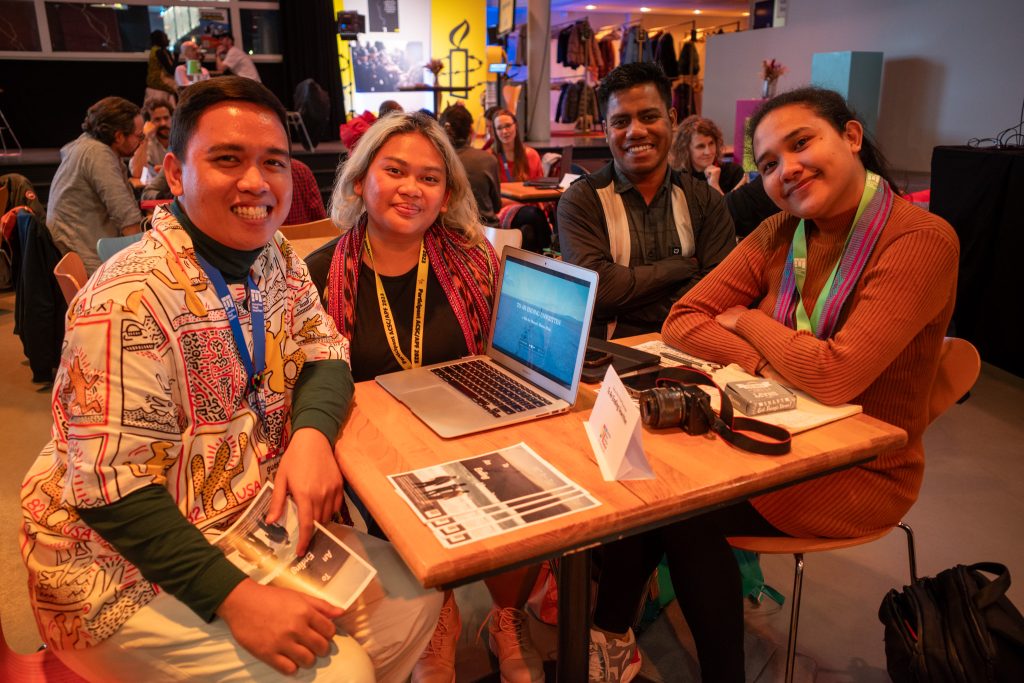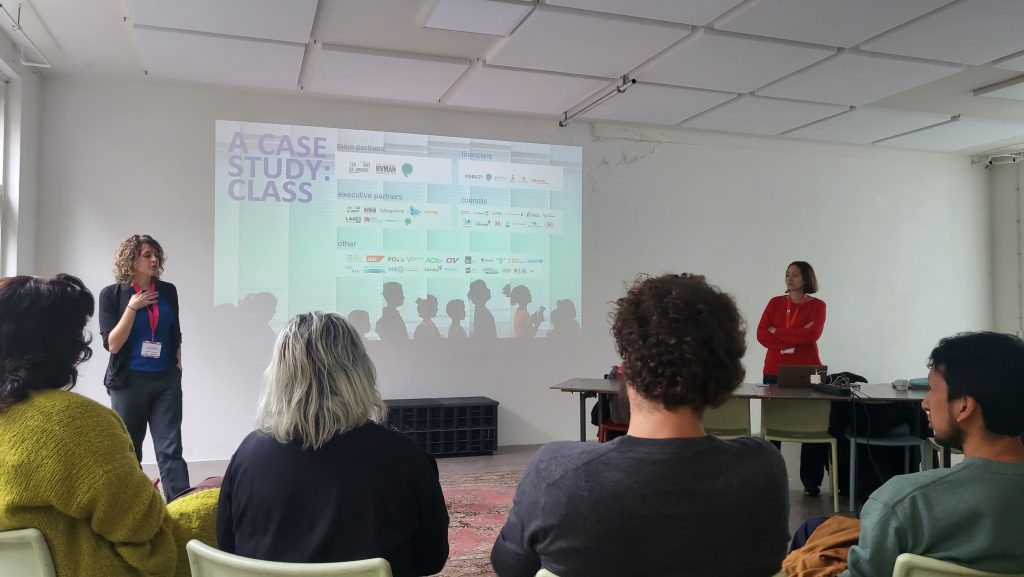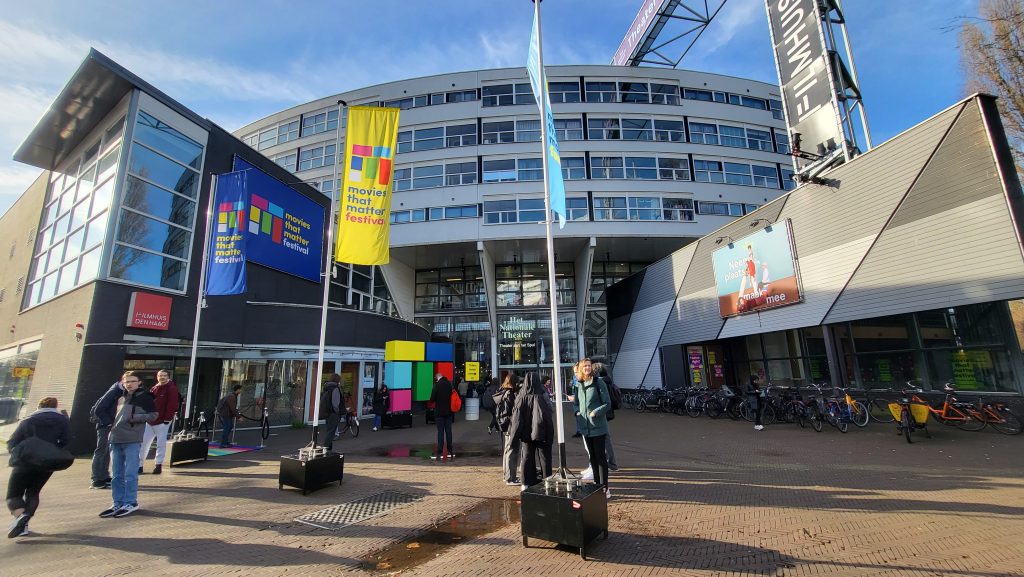This article is written by our friends Yedida Letedara and Crispianus Sebleku of Komunitas Film Kupang. Together, AJAR and the Komunitas partnered on producing documentaries exploring the experiences of youth and survivors of atrocities in Indonesia, with support from the United Nations Democracy Fund and the Ministry of Education, Culture, Research, and Technology of Indonesia.

“Are you an activist, or are you an artist?”
That question opens the first day of Take on Film & Impact workshop that ran during Movies That Matter Film Festival in Den Haag, the Netherlands. There was us, two representatives of Komunitas Film Kupang coming with Asia Justice and Rights, listening in the room to pitch our latest documentary to an international audience, hoping to reach viewers beyond Indonesia. For us, as filmmakers from Kupang, this distinction feels… unusual.
In our experience, producing film, somehow, can afford no distance with the subject matters. Komunitas have produced various audiovisual works for the past eleven years, that in hindsight always leaned towards economical, social, and cultural heartbeat in the eastern part of the country. Perhaps it’s why we don’t call ourselves formally as a production house, but instead, a film community: film lets us work in large numbers as a community, each contributing to different roles, and making something that’s greater than the sum of its parts.
As we held hundreds of screenings across Flobamora, we saw films gathering communities to watch the world around them being documented, seeing familiar faces on screen, and discussing how what they see there can affect their lives outside of the screen. It was only in the past two years that we knew an industry-accepted of what we’re aiming: impact.
Learning More about Impact
The documentary To An Ending Unwritten, directed by our friend Abe, is the first work we get to actually plan for its impact. Developed from a program exploring the experiences of youth and survivors of atrocities in five cities across Indonesia, we believe the stories gathered are worth to be remade into a documentary with the impact intended from the very beginning.
Chances came when we got selected to participate in In-Docs’ !mpact Lab last year to first plan out our impact campaign, then continue with our participation in Movies that Matter’s Take on Film & Impact programme. Here, our documentary was one among ten selected to further develop its impact goals and strategies. Over weeks before and during the programme, our vision, both for the film and the impact, had to be tested again and again.

From day one, our mentors Hasse van Nunen, Khadidja Benouataf, and Irena Taskovski shared their firsthand experience. They taught us that impact demands collaboration and providing our fellow changemakers with knowledge, networks, and inspiring examples – something that we were a bit shorthanded at the time. It is through our interactions and inputs from other filmmakers, that we learn to present our story better.
Through Panels and Pitches
Initially, imagining our film could contribute to social change felt a bit far-fetched, if we can be honest. However, joining the panels and hearing explanations from other filmmakers offered us a reassurance. We learned from the youth-led “Not Just Celsius” campaign, which successfully leverages the International Court of Justice for climate action. We also joined DISCO’s inspiring vision for decentralised, community-driven film distribution models.
And through the pitching process (that leave us a bit nervous), it allowed us to connect with potential partners – filmmakers, NGOs, and funders. The roundtables and one-on-one discussions also connected and provided us valuable opportunities to explore potential collaborations with people from other part of the world.
Watching Movies

Of course it’s not a truly film festival experience without actually going from studio to studio to watch dozens of movies while we’re here. Between the programme’s sessions, we sneaked ourselves to watch Asmae El Moudir’s The Mother of All Lies, a film that explores generational trauma and the power of stolen memories, through a family and community forced to confront a painful, and unresolved past – of one fateful evening in 1981 when riots and mass graves in Casablanca, Morocco rocked both the family and the country.
This exploration of personal and collective memory resonated with the work of our fellow programme participants, Bálint Révész and Krisztina Meggyes, whose film KíX won the Camera Justitia Award. Their film spotlights a troubled Budapest street kid Sanyi as he grows from 8 to 18 years old. Over the course of this decade, he turns from a mischievous youth into a public enemy. Interesting that it spotlights issues that often fail to capture headlines, leading to entrenched societal weaknesses resulting in individual, ubiquitous tragedies that are often ignored.
For us, the program continued to broaden its perspective with Drawing a Line, showcasing the work of filmmaker Sama Pana and protagonist Rachita Taneja. This partly-animated documentary highlights a young Indian cartoonist, Rachita whom we met at the end of the screening, and her defiant use of humor and art to resist censorship and challenge the oppressive ideologies promoted by the Indian government.
The diverse films we watched show the profound power of documentary filmmaking to look closer at complex social issues – from deeply personal trauma to government oppression. We were inspired by the stories presented and the dedication of the filmmakers. At a time when human rights documentaries are facing increasing challenges, especially in our country, these filmmakers display remarkable courage in taking both creative and personal risks.
And there we were, bringing all these experiences and insights back to Kupang, and see if our documentary and Komunitas will get to create things more meaningful than ever for the community – including through the impact of To An Ending Unwritten.